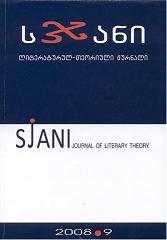ლიტერატურის თეორია – XX საუკუნის ძირითადი მეთოდოლოგიური კონცეფციები და მიმდინარეობები
The Review of the Book - "Literary Theory - Basic Concepts and Methodological Tendencies of XX Century
Author(s): Venera KavtiashviliSubject(s): Literary Texts
Published by: ლიტერატურის ინსტიტუტის გამომცემლობა
Summary/Abstract: The publishing of the book “Literary Theory – Basic Concepts and Methodological Tendencies of XX Century” by Shota Rustaveli Institute of Georgian Literature should be mentioned among the most essential events that has taken place in Georgian literary criticism in 2008. This is a serious attempt to eradicate the spiritual shortage and drawbacks, from which Georgian culture has suffered during the Soviet period. The book that is under analysis points out the main line from Western literary-theoretical tendencies and the thoughts of the schools which were interested in scientific analysis of artistic texts and tried to identify their relation towards relative disciplines of humanities (philosophy, aesthetics, linguistics, psychology), which paves the path towards the establishment of multidimensional models of text research. The themes that are presented in the book are arranged chronologically and aid the reader not only to look through the general processes, but also to identify the deduction, similarity-difference and others between schools and tendencies. The book starts with the analysis of the works of Russian formalists, which is completely natural, because they later formed bases for formalistic directions that have sprung up. Moreover, the methods and results of the practical research made by them, have defined the development of structural poetics, semiotics, informational theory and machine translation. It is naturally followed by discussion of issues like: “Theoretical Conception of Bakhtin. Dialogue Criticism”; “Phenomenological Criticism”; “Hermeneutics”; “New American Criticism”; These issues cover 20-70s of the XX century and represent a sample for following the processes of synchronic and diachronic development of tough socialpolitical thinking and critical analysis. It is acknowledged, that portraying the general picture of structuralism without Prague School is impossible, from historical as well as from theoretical point of view. This school was the first to work out the tasks and methods of aesthetics and poetics and developed its characteristic epistemological viewpoints before post-structuralism. The book covers the methods that are peculiar for that school, such as: inter-disciplinarity, difference between literary and spoken language. The essential researches, like: “Mythological Criticism in Practice”, “Jung’s Psychology and his Understanding of Archetype”, “Psychoanalysis and Artistic Works”, connected with Sigmund Freud and his psychoanalytical method are also displayed in the book, but in this case emphases are made on the analysis of Carl Gustav Jung’s viewpoints, who developed Freud’s doctrine by coining the concept of “Collective Unconscious”. The analysis of Harold Bloom’s theory of literary relations, to be more exact “Anxiety of Influence” or the concept known as Bloom’s “Antithetic Criticism” is represented in the book in an interesting way.
Journal: სჯანი
- Issue Year: 2008
- Issue No: 09
- Page Range: 241-249
- Page Count: 9
- Language: Georgian

